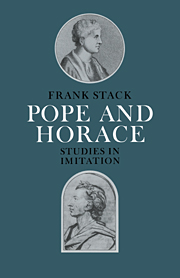Book contents
- Frontmatter
- Contents
- Acknowledgements
- List of abbreviations
- Preface
- PART I INTRODUCTIONS
- I Interpreting Horace
- 2 Imitation
- PART II THREE HORATIAN SATIRES (1733–4)
- PART III MATURE HORACE (1736–7)
- PART IV THE TIME OF TENSION (1738)
- Epilogue
- Appendix: Imitations of Horace published 1730–40
- Notes
- Bibliography
- Index
- Frontmatter
- Contents
- Acknowledgements
- List of abbreviations
- Preface
- PART I INTRODUCTIONS
- I Interpreting Horace
- 2 Imitation
- PART II THREE HORATIAN SATIRES (1733–4)
- PART III MATURE HORACE (1736–7)
- PART IV THE TIME OF TENSION (1738)
- Epilogue
- Appendix: Imitations of Horace published 1730–40
- Notes
- Bibliography
- Index
Summary
But to come to particulars: Heinsius and Dacier, are the most principal of those, who raise Horace above Juvenal and Persius. Scaliger the Father, Regaltius, and many others, debase Horace, that they may set up Juvenal: And Casaubon, who is almost single, throws Dirt on Juvenal and Horace, that he may exalt Persius …
Dryden, ‘Discourse of Satire' (p. 50)In writing his Imitations of Horace Pope was able to allude to a complex tradition of Horatian interpretation, a tradition which is as varied, indeed at times as contradictory, as Horace's poetry itself. Since each single Imitation draws upon so many of these traditions, often with light and telling allusions, it will be useful to set out these main lines of interpretation. This will also enable us to assess the originality and individuality of Pope's treatment of Horace. We will find how vigorously and imaginatively Pope treats the traditional views, by turns energetically endorsing them, rethinking them afresh, or questioning their validity.
Evidence for these seventeenth- and eighteenth-century views of Horace can be drawn from several types of sources. Editions of Horace with their ‘Prefaces’ and interpretative notes are invaluable: the most important are those of Daniel Heinsius (1629), André Dacier (1683–97), L. Desprez (1694), and Richard Bentley (1711).
- Type
- Chapter
- Information
- Pope and HoraceStudies in Imitation, pp. 3 - 17Publisher: Cambridge University PressPrint publication year: 1985

